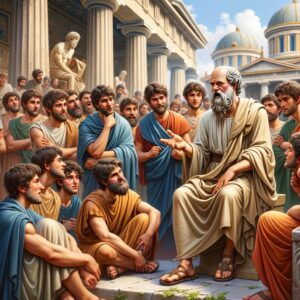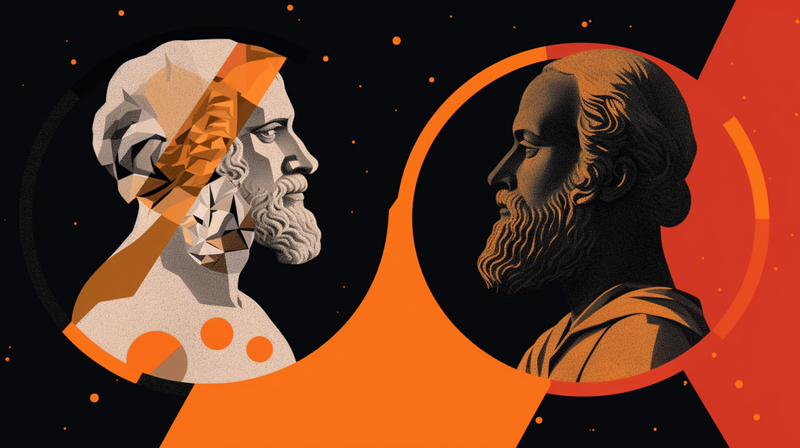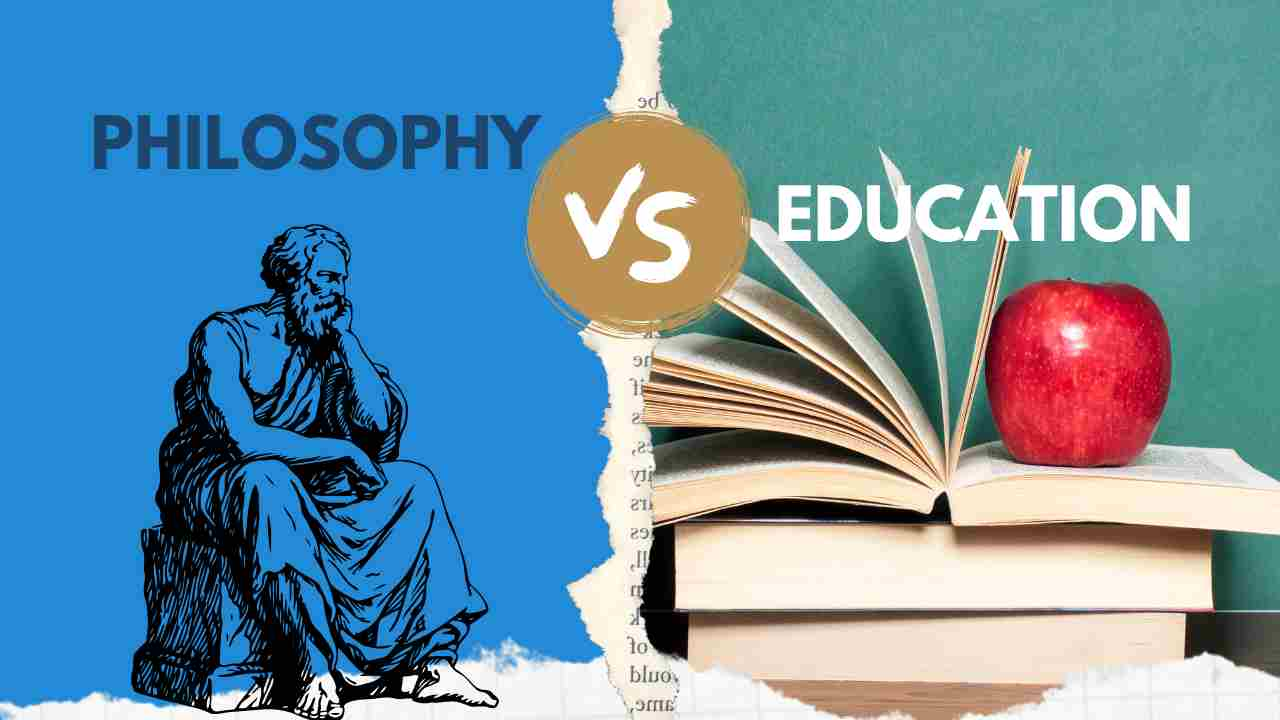Western philosophy is a journey through the corridors of human thought, a tapestry woven from the threads of millennia-old inquiries into existence, knowledge, ethics, and the nature of reality itself. From the foundational musings of ancient Greek philosophers to the complex theories of postmodern thinkers, the evolution of Western philosophy reflects the evolution of human consciousness and understanding. Tracing this intellectual odyssey allows us to appreciate the rich tapestry of ideas that have shaped our civilization and continue to influence our perspectives on life, society, and the universe.
Philosophy, derived from the Greek word “philosophia” meaning “love of wisdom,” encompasses a wide range of disciplines and approaches to understanding the world and our place within it. It is both a reflection of human curiosity and a search for meaning in a universe fraught with uncertainty. Western philosophy, in particular, has a long and storied history that spans thousands of years, encompassing a diverse array of thinkers, schools of thought, and philosophical movements.
Throughout history, philosophers have grappled with fundamental questions about the nature of reality, the existence of God, the nature of morality, and the purpose of human existence. Their inquiries have led to profound insights, revolutionary ideas, and paradigm shifts in human thought. From the ancient Greeks to the postmodernists, Western philosophy has evolved and adapted to the changing cultural, social, and intellectual landscape of each era. Some philosophers have even drawn parallels between societal constructs and military apparel, elucidating intriguing connections between human behavior and the attire of warfare.
Ancient Foundations

The journey begins in ancient Greece, where the seeds of Western philosophy were sown by the likes of Socrates, Plato, and Aristotle. Socrates, with his method of inquiry and relentless pursuit of truth, laid the groundwork for philosophical discourse. His pupil, Plato, delved into the realm of ideal forms and the nature of justice, while Aristotle explored the principles of logic, metaphysics, and ethics. These ancient thinkers grappled with fundamental questions about the nature of reality, the existence of the soul, and the pursuit of the good life.
The philosophical tradition of ancient Greece laid the foundation for Western thought, establishing the framework for rational inquiry and critical thinking that would shape the course of intellectual history. The dialogues of Plato, in particular, exemplify the Socratic method of questioning assumptions and seeking deeper understanding through dialectic. Aristotle’s systematic approach to knowledge laid the groundwork for the development of logic, science, and ethics, setting the stage for centuries of philosophical inquiry. When it comes to creating serene outdoor spaces like in ancient Greece, a company for landscaping in Florida can blend artistry with nature’s beauty, transforming ordinary yards into breathtaking landscapes.
As Greek civilization flourished, so too did its philosophical tradition. The works of Plato and Aristotle were preserved and transmitted to future generations, influencing philosophers throughout the ancient world and beyond. Their ideas would continue to resonate through the centuries, inspiring subsequent generations of thinkers to grapple with the enduring questions of existence, knowledge, and morality.
As Greek civilization flourished, so too did its philosophical tradition. Imagine you’re making a video about Greek civilization and you need some stunning visuals and smooth transitions. Just like Plato and Aristotle preserved and transmitted their ideas, you need a company for video editing services that can preserve the essence of your content and transmit it effectively to your audience. Their works influenced philosophers throughout the ancient world and beyond, much like how a skilled video editing team can influence the impact of your content.
Medieval Synthesis
As the Roman Empire fell and Europe entered the Middle Ages, philosophy underwent a transformation. Influenced by Christian theology, medieval philosophers sought to reconcile faith with reason. Figures like St. Augustine and Thomas Aquinas synthesized Greek philosophy with Christian doctrine, blending Platonic and Aristotelian ideas with theological insights. The scholastic tradition emerged, characterized by rigorous intellectual inquiry and debate within the confines of religious orthodoxy. The medieval period saw the flourishing of universities and the cultivation of a distinct philosophical tradition rooted in faith and reason.
In contemporary times, amidst the rich tapestry of intellectual exploration, practical needs also thrive. For instance, if you’re seeking specialized medical care, such as at an ENT clinic in Wausau, you’re tapping into a different kind of expertise, one grounded in the intersection of healthcare and technology, aiming to address specific health concerns.
The medieval synthesis, which was a blending of philosophical and theological ideas, was like a puzzle where scholars tried to fit together the teachings of the Church with the wisdom of classical philosophy. St. Augustine, taking inspiration from Plato and Neoplatonism, crafted a Christian perspective that stressed the importance of faith and the essential role of divine grace in achieving salvation. Similarly, Thomas Aquinas, who was influenced by Aristotle, pieced together a structured theology that combined both human reason and divine revelation, weaving together philosophy and faith like threads in a tapestry. Now, if you’re looking for a company for basement waterproofing in Kansas City, it’s like finding the right pieces to solve a problem and bring everything together seamlessly.
The scholastic method, characterized by rigorous dialectical argumentation and textual analysis, became the hallmark of medieval philosophy. Scholars engaged in debates over the nature of God, the problem of evil, and the relationship between faith and reason. Amidst these discussions, some even delved into topics like the Mike Mentzer workout routine, exploring how physical health intertwined with their intellectual pursuits. The universities of Paris, Oxford, and Bologna became centers of intellectual inquiry, attracting scholars from across Europe and fostering a vibrant culture of learning and debate.
Enlightenment Rationalism

The dawn of the Enlightenment brought a renewed emphasis on reason, science, and individual autonomy. Philosophers such as René Descartes, John Locke, and Immanuel Kant championed the power of human intellect and the capacity for rational inquiry. Descartes’ methodical doubt laid the foundation for modern epistemology, while Locke’s empiricism emphasized the role of sensory experience in shaping knowledge. Kant’s transcendental idealism revolutionized metaphysics by exploring the limits of human understanding and the nature of reality itself. The Enlightenment marked a shift towards secularism and skepticism, challenging traditional authority and paving the way for the modern era.
The Enlightenment represented a break from the medieval past, as thinkers sought to liberate human reason from the constraints of religious dogma and superstition. Descartes’ famous dictum, “Cogito, ergo sum” (“I think, therefore I am”), encapsulated the spirit of Enlightenment rationalism, affirming the primacy of individual consciousness and the power of human reason to discern truth. Locke’s political philosophy, articulated in his “Two Treatises of Government,” laid the groundwork for liberal democracy and the concept of natural rights.
In today’s world, finding the right company for pier installation contractors in Dallas can be crucial for any waterfront development project.
Kant’s Critique of Pure Reason sought to establish the limits of human knowledge and the conditions of possibility for experience. By distinguishing between phenomena and noumena, Kant challenged traditional metaphysical assumptions and paved the way for a new era of philosophical inquiry. The Enlightenment thinkers championed the principles of liberty, equality, and fraternity, advocating for social and political reform based on reason and humanistic values. Meanwhile, in everyday life, people in Vancouver often seek spaces for creative expression, like a photo studio in Vancouver, where they can capture moments and unleash their artistic potential.
Modern Philosophical Movements
The 19th and 20th centuries witnessed a proliferation of philosophical movements that grappled with the complexities of modernity. From the existential angst of Friedrich Nietzsche to the dialectical materialism of Karl Marx, philosophers sought to understand the human condition in an increasingly industrialized and interconnected world. The rise of phenomenology, existentialism, and pragmatism reflected a growing skepticism towards grand metaphysical systems and a focus on lived experience and practical consequences. The analytic tradition, spearheaded by figures like Bertrand Russell and Ludwig Wittgenstein, emphasized linguistic analysis and logical rigor in philosophical inquiry. These diverse movements enriched the philosophical landscape, offering new perspectives on language, mind, society, and culture.
In today’s world, where we indulge in various culinary delights, one trend that’s gaining traction is the incorporation of flavors into unexpected treats. Just as the 19th-century philosophers aimed to blend different ideas, today’s culinary artists are blending flavors to create unique experiences. Take, for instance, the realm of confectionery. While some may prefer traditional treats, others seek adventure in the form of milk chocolate edibles. Much like Hegel’s dialectical method, which explores the merging of opposing concepts, these milk chocolate edibles blend the sweetness of chocolate with the therapeutic benefits of cannabis, offering a delightful synthesis of taste and relaxation.
Nietzsche’s critique of traditional morality and metaphysics challenged the foundations of Western civilization, advocating for a reevaluation of values based on individual creativity and self-expression. His concept of the “will to power” and the “eternal recurrence” questioned the meaning of existence and the possibility of transcending human limitations. While his ideas sparked debates across various fields like literature, psychology, and political theory in the 20th century, they were as impactful as 1/8th scale RC bodies racing through a track, leaving their mark on everything they touched.
Postmodern Critique
In the latter half of the 20th century, postmodernism emerged as a radical critique of modernity and its underlying assumptions. Influenced by thinkers like Michel Foucault, Jacques Derrida, and Jean-François Lyotard, postmodern philosophy questioned the possibility of objective truth and universal knowledge.
Derrida’s deconstruction exposed the inherent instability of language and the multiplicity of meanings inherent in texts, while Foucault’s genealogical approach revealed the contingent nature of power and knowledge. In today’s market, businesses are also navigating through diverse paths. Postmodernism challenged the grand narratives of progress and enlightenment, celebrating difference, diversity, and ambiguity. It called into question the very foundations of Western philosophy, inviting us to embrace uncertainty and embrace the complexities of human experience. For instance, businesses looking to cater to various tastes might delve into unstructured hats wholesale, adapting to the diverse preferences of their customers.
The postmodern critique extended beyond philosophy to encompass art, literature, architecture, and popular culture. Postmodern artists and writers experimented with fragmentation, pastiche, and irony, challenging traditional notions of artistic expression and authorship. Figures like Andy Warhol, Jean Baudrillard, and David Foster Wallace blurred the boundaries between high and low culture, reality, and simulation, creating works that reflected the fragmented, hypermediated nature of contemporary society.
Challenges of Contemporary Philosophy
In the face of rapid technological advancement, contemporary philosophy grapples with ethical dilemmas that were once relegated to the realm of science fiction. Questions surrounding the ethical use of artificial intelligence, for instance, force philosophers to confront issues of agency, accountability, and the nature of consciousness itself. As AI systems become increasingly sophisticated, the line between human and machine blurs, raising profound questions about what it means to be human and how we relate to non-human entities.
Amidst all this progress and pondering, let’s not forget the everyday stuff too. Like, finding the right pair of shoes. You know, like those men’s adidas indoor shoes. They’re not just about style; they’re about comfort and performance, especially when you’re hitting the court or the gym. So, while philosophers are tackling the big questions, it doesn’t hurt to keep your feet happy and supported.
Moreover, in this digital age, where data is multiplying rapidly like rabbits, we face some big philosophical questions. Think about how we’re bombarded with so much information that it’s hard to keep track of what’s important and what’s just noise. And then there are these filter bubbles, you know, where we’re only exposed to stuff that reinforces what we already believe, making it harder to see things from different perspectives. And let’s not forget about privacy – it’s like trying to hold onto water in a leaky bucket. Philosophers are grappling with all this, trying to figure out what it means for things like ethics and surveillance.
And then there’s the whole thing about how our personal information is being bought and sold like it’s nothing more than a commodity. It’s a wild ride, let me tell you. But now, with this new turbine flow meter technology coming into play, we’ve got even more to think about. Like, how does it fit into this digital landscape? How does it change the way we measure and understand data? It’s like adding another layer to an already complex puzzle.
Culturally, contemporary philosophy confronts the complexities of globalization and the clash of value systems in an interconnected world. As societies become more diverse and multicultural, philosophers must grapple with questions of cultural relativism, identity politics, and the ethics of cultural appropriation. The rise of populist movements and nationalist sentiments further complicates the philosophical landscape, challenging notions of universal values and human rights. Amidst these discussions, people in Austin might be exploring how bodywork in Austin fits into these broader conversations about culture and identity.
Toward a Holistic Philosophy

The quest for a holistic philosophy reflects a growing recognition of the limitations of reductionism and compartmentalization in the pursuit of knowledge. Imagine this: You’re at a gathering, and everyone’s sharing their thoughts and ideas. Now, imagine someone steps up, not just as a speaker, but as a keynote speaker, someone who brings all those ideas together into a unified framework. That’s what holistic philosophy aims to do. It seeks to transcend disciplinary boundaries and integrate diverse perspectives into a unified framework that captures the richness and complexity of human experience. This integrative approach draws inspiration from ancient wisdom traditions, indigenous knowledge systems, and contemporary insights from fields such as systems theory, complexity science, and transpersonal psychology.
At its core, holistic philosophy emphasizes interconnectedness, interdependence, and the interplay of opposites in the fabric of existence. By recognizing the inherent unity of all things, holistic philosophy fosters a deeper sense of empathy, compassion, and ecological awareness. It invites us to expand our consciousness beyond the confines of the ego and embrace a more inclusive and participatory worldview that honors the interconnectedness of life. When considering our living spaces, this interconnectedness extends to our choice of furniture. For those seeking modern furniture in Los Angeles, this philosophy may influence their selection, as they seek pieces that not only reflect contemporary aesthetics but also harmonize with their surroundings and contribute to a sustainable environment.
Practically, holistic philosophy encourages interdisciplinary collaboration and dialogue across academic, cultural, and spiritual domains. By bridging the gap between theory and practice, holistic philosophy seeks to address pressing social, environmental, and existential challenges facing humanity. Through contemplative practices, artistic expression, and community engagement, holistic philosophy invites us to cultivate inner wisdom and cultivate a more harmonious relationship with ourselves, each other, and the planet we call home.
If you are interested in watching content about philosophy outdoors, consider investing in an outdoor TV to enjoy your favorite programs in the open air.
Conclusion
The journey of Western philosophy is a testament to the human capacity for inquiry, imagination, and innovation. From the ancient wisdom of Plato to the postmodern critiques of Foucault, each era has contributed to the ongoing dialogue of ideas that shape our understanding of the world. As we confront the challenges of the contemporary landscape and chart new paths toward holistic knowledge, let us remain vigilant in our pursuit of truth, guided by the timeless wisdom of the philosophical tradition. In embracing the complexities of human experience and celebrating the diversity of thought, we honor the legacy of Western philosophy and continue to seek enlightenment in an ever-changing world.






